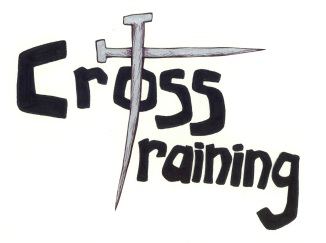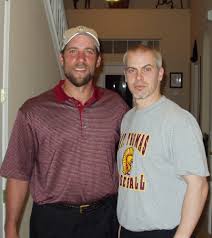TEAMwork
A Bible Talk for Athletes (and everyone else)

Opening question:
Name someone who has been a great teammate to you.
Explain why.
I think of a couple of guys. These men help me lead a student athletes’ Bible discussion. The first is Mike Santory. Mike is a committed disciple who loves people. Mike loves to study the Bible with people. He will often start studies with people, and then he’ll call me in to get involved. So we collaborate well in that way. Mike is a busy guy. He has a job as a fitness and conditioning coach, and he is married and has a couple of college-age children. But he makes time for students, and I appreciate the work he is doing on campus.
Then there is Scott Muscat, who is the head coach of the Saint Thomas Aquinas College (STAC) baseball team. Scott is a super busy guy. He teaches history in high school. Manages a team that finished third in the nation last year among Division II schools. And he is married with three children. That means he has a lot on his plate. But he had this idea for a Bible discussion for student athletes, he gets this room for us, and he’s here participating. He is a great example of commitment and discipleship.

Coach Scott Muscat (right) with Hall of Fame Pitcher John Smoltz
The discussion:
Did any of you watch the US Open Tennis Championship in August of 2017? Sloan Stevens won the women’s championship and Rafa Nadal won the men’s. When they were interviewed, they both thanked their team. These were individual trophies they hoisted into the air, but they still talked about their team. Why is that?
What are some of the positions on a team, and why is that position important?
- Coaches. Various coaches. ****In college football they had gotten serious about coaches being on the field. They will flag a coach for stepping too far on the field. I noticed in college football there are people who are assigned to keep other coaches off the field. The defensive coordinator for Clemson is very passionate. He constantly approaches the field to coach up his players. There is a big guy who stands behind this coach. When the coach is about to step on the field, this assistant coach will put his arms around the coach and pull him back. That’s his job.
- Team leaders. Team captains. Senior leadership. Quiet leaders who lead by example.
- Utility players. They play many positions and are ready to play when their number is called.
- Strength and conditioning coaches. Coach Santory. He loves torturing athletes.
- Team sponsors. It cost money to play sports. Someone plays for the field time, for the buses, for the equipment.
- The water person. The equipment person. **I went to a middle school football game and the water boy was there working hard on the sideline. I thought, What an inglorious job. But someone has to do it.
Watch the YouTube video-The Power of Good Teamwork. https://www.youtube.com/watch?v=xd8y2Lvxmo4
Questions:
- What did that video demonstrate about teamwork?
- When you work together as a team, you can defeat a bigger, more intimidating opponent who isn’t working with a team.
- Also, teams still need leadership. With the ants, one of the ants had to help the team get organized.
- How important is teamwork to success in sports?
- What are the most important ingredients of teamwork?
- Everyone must know their role and do their job.
- You must keep ego out of the picture. “No ‘I’ in team.”
- Teammates encourage each other.
3. Let’s look at a passage about Jesus. Let’s look at Mark 2:1-12.
A few days later, when Jesus again entered Capernaum, the people heard that he had come home. 2 So many gathered that there was no room left, not even outside the door, and he preached the word to them. 3 Some men came, bringing to him a paralytic, carried by four of them. 4 Since they could not get him to Jesus because of the crowd, they made an opening in the roof above Jesus and, after digging through it, lowered the mat the paralyzed man was lying on. 5 When Jesus saw their faith, he said to the paralytic, “Son, your sins are forgiven.”
6 Now some teachers of the law were sitting there, thinking to themselves, 7 “Why does this fellow talk like that? He’s blaspheming! Who can forgive sins but God alone?”
8 Immediately Jesus knew in his spirit that this was what they were thinking in their hearts, and he said to them, “Why are you thinking these things? 9 Which is easier: to say to the paralytic, ‘Your sins are forgiven,’ or to say, ‘Get up, take your mat and walk’? 10 But that you may know that the Son of Man has authority on earth to forgive sins….” He said to the paralytic, 11 “I tell you, get up, take your mat and go home.” 12 He got up, took his mat and walked out in full view of them all. This amazed everyone and they praised God, saying, “We have never seen anything like this!”
Questions:
- Vs. 1. What is the first thing we see about Jesus in this passage? He came home to Capernaum.
The text says Jesus came home to Capernaum. Where was Jesus born? Bethlehem. Where was Jesus raised? Nazareth. But during his ministry, Capernaum was home.
Capernaum was a fishing village in Galilee. It was Jesus’ base in his
northern ministry. Jesus came home. He had a team. Who made up the
team of Jesus?
- His disciples,
- the women who supported his ministry,
- his followers.
- You could even say the Father and the Holy Spirit. These three have been teammates for all of eternity.
- If Jesus had a team, then certainly we need a team.
- Vss. 2-5. Where do you see teamwork happening in this story?
The friends of the paralytic. What do you notice about these guys?
*Committed friends.
*Perseverance.
*Radical.
What attributes do you appreciate in a good teammate? Or a good friend?
*Someone who will tell you the truth. –I called Phil Garrison today because I needed someone to tell me the truth.
*Someone who will encourage you when you are down. –I had lunch with Don Hanson. Talked to Ryan Erbe on the phone.
- Vss. 6-12. Who were these “teachers of the law” and what were they doing in the story?
***They were critics. Negative voices.
Even when you do something really positive, people will still be negative. You need to do your best to keep negative voices out of your head.
4. What are some of the negative voices we hear spiritually?
*You can’t do this.
*You’ll never grow. You’ll never change.
*This is too difficult. Being a follower of Jesus is challenging. But why would you back down from a challenge?
*I don’t know enough Bible to make a solid, spiritual decision. This might be the case right now, but it doesn’t always have to be that way. Read the word. Learn what the Bible says.
5. How did Jesus react to these negative voices?
He called them out. Verse 8 reads, “Immediately Jesus knew in his spirit that this was what they were thinking in their hearts, and he said to them, ‘Why are you thinking these things?’”
Jesus says, “What’s up with you guys?” He doesn’t allow their negativity to keep him from doing what is right.
***In the martial arts, one of the aspects of our school was that it was so positive. Negativity had to be checked at the door. “I can’t” became “Yes I can!”
You can’t control how people are around you, but you can control your reaction to negativity.
Conclusion:
- Be a good teammate. What is your role on the team? A great role is to be an encourager, the person who lifts the spirit of the team.
- Build a life team around you who will encourage you to grow to reach your full potential.
3. Be positive. Stay positive. Expel voices of negativity.
4. You can be your best for God, for others, and for yourself. Decide that you will be your best.








